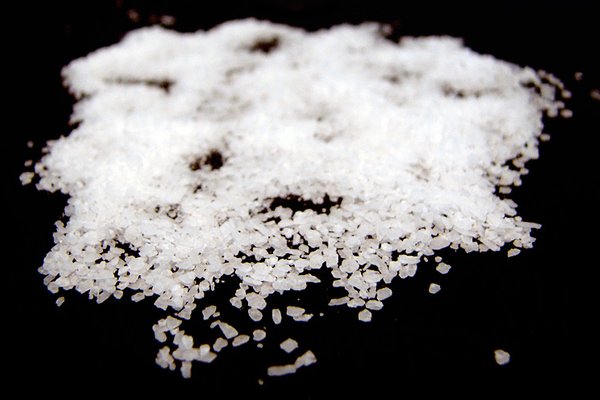Salt
Salt is one of the most important ingredients in any kitchen and it's worth some time to talk about. While sodium is a vital nutrient, it's one that is all too often over-consumed by Americans. You'll be happy to know though that most of your sodium intake isn't from home-cooked meals, it's from processed foods. So don't feel bad about salting your pasta water--you'll be getting way less salt that way than from a frozen TV dinner. The FDA notes that adults should consume less than 2.3g of sodium per day, the photo in this article is of the amount of kosher salt that would be (and yes, it's more than you'd think).

Table salt
Table salt is most likely what you grew up using. It's dirt cheap, usually sits in a shaker for long periods of time and thanks to its iodide content helps prevent the growth of goiters. There's nothing technically wrong with table salt, but we don't use it too often. We keep it around for baking.
Kosher salt
Kosher salt is our go-to salt--we use it in almost everything. Despite the name, there's nothing especially religious about kosher salt--it gets the name for being what is used to make meats kosher.
Kosher salt has a much larger grain than table salt, making it ideal for sprinkling by hand. It doesn't dissolve as quickly as table salt which is especially great for seasoning meats, but not so great for baking recipes. Kosher salt's lack of iodine and anti-caking agents makes for a more pure taste and is the primary reasons many chefs use it. Thanks to the larger crystal size, kosher salt also has a lower salinity so it's harder to make a mistake and over salt foods.
One thing to watch out for with kosher salt is that it takes up less volume than table salt (the larger grain means more air pockets). That can foul up sensative recipes. There's a conversion guide on the back of most brands, but if you have to go backwards (e.g. the recipe calls for kosher and you only have table), simply multiply by 2/3.
Kosher salt is what we use in most recipes, but we note it in the ingredients list just in case.
Sea salt
Sea salt is what it sounds like, salt collected from the ocean. This can happen a few ways, but most commonly salt water is transfered into shallow coastal pools and allowed to air dry over a long period of time. Because sea salt contains many other minerals present in sea water, its flavor is highly varying between varietals. Sea salt is often used by chefs to finish dishes because of its appearance and crunchy texture. Prices vary widely, but sea salt is several times more expensive than mined salts.
Pickling / Canning salt
Pickling salt is similar to kosher salt in that it has no additives, but is very foundly ground to faciliate quick dillution. The iodine in table salt can produce a cloudy brine and the anti-caking agents aren't water soluble so will unattractively settle. If you're in a pinch, running kosher salt through a food processer makes a usable pickling salt.
